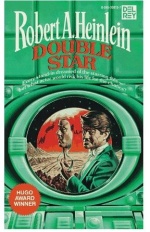| Naše
izdanje
Robert A. Heinlein |
| Dvostruka zvijezda (Double Star)
Robert A. Heinlein
The route Lorenzo Smythe takes to reach this post is, however, just a little different from that of the real-world actor. The Great Lorenzo, as he styles himself, is conceited, arrogant, out of work, and down to his last half-Imperial when he is offered the job of doubling for a well-known political figure. The job is so obviously beneath his dignity that he is ready to turn down the offer when the Martians take a hand, and Lorenzo finds himself involved in murder, kidnapping, and slicing both humans and Martians into small pieces to flush down the disposal. Forced by these circumstances to take the job, Lorenzo is even more disturbed when he finds out the identity of the person he is supposed to double for, none other that the leader of the opposition party, Joseph Bonforte, whose politics, what little he knows of them, he despises. But his own inflated idea of his abilities allows him to steady down and start studying for the role, a role he will play for much longer than he could ever anticipate. This book is a character study, carefully and artfully detailing how Lorenzo changes under the influence of having to pretend to be someone he is not, aided by the immediate staff of the man he impersonates. It is fascinating to watch him change from someone you probably wouldn't invite into your home, to confused and beginning to search for some moral basis to his life beyond 'the show must go on', and finally to a man doing his best not just for himself, but for all intelligent beings, truly becoming the man he is portraying. Heinlein makes good use of his own experience in running for the California State legislature, as he describes the mechanics of running a political campaign, just how decisions are reached, how dependent a politician is upon the quality of the staff he selects, so that these items ring with real-world ambience. This is also probably the first book that clearly showed his leaning towards what would now be called Libertarianism, but this exposition is fairly muted, unlike some of his later works. And it wouldn't be a Heinlein book without his side commentaries: here he covers monarchies, civil servants, patronage, media management, taxes, unions, truth and lies, prejudice and xenophobia. Published at a time when a novel of character was practically unheard of in the science fiction world, this work, like so many others by Heinlein, expanded the boundaries of the field, another step in lifting it out of its self-imposed pulp ghetto and back to the world of literature. This is probably part of the reason this book earned Heinlein his first of five Hugo awards for best novel of the year, a record matched by no other author. The rest of the reason? It's a fun, fast, great read; a story that hasn't lost its power to engross, entertain, and expand your view of the world. |
 The year is 1956. Eisenhower is in the White House, following a long line of military men to reach that post. And this slim book appears, presenting the wild idea of an actor, perhaps not even a very good actor, who manages to reach the position of head of state. Obviously an idea like this could only appear within the realm of science fiction! What a difference in perspective an additional twenty five years will make, as once more science fiction becomes fact.
The year is 1956. Eisenhower is in the White House, following a long line of military men to reach that post. And this slim book appears, presenting the wild idea of an actor, perhaps not even a very good actor, who manages to reach the position of head of state. Obviously an idea like this could only appear within the realm of science fiction! What a difference in perspective an additional twenty five years will make, as once more science fiction becomes fact.